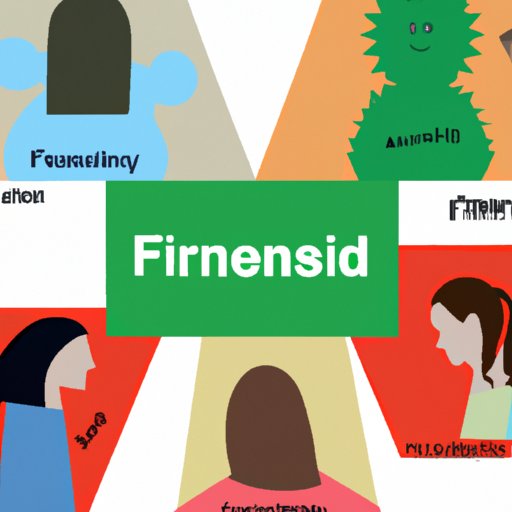Introduction
Friendships are a vital part of life, providing us with companionship, support, and connection. But have you ever stopped to consider what type of friend you are? Analyzing your friendship strengths and weaknesses can help to give you insight into what kind of friend you are, and how you can become an even better one.
The Oxford English Dictionary defines friendship as “the feelings or behavior that exist between friends; the state of being friends”. It is a relationship based on mutual trust, respect, and understanding. Friendships come in various forms and last for different lengths of time, but they all provide us with a sense of belonging and community.
In this article, we will explore what type of friend you are by analyzing your friendship strengths and weaknesses. We will look at ways to create a friendship personality profile, explore ideal friend requirements, identify emotional needs, and examine your level of commitment. Let’s get started.

Analyzing Your Friendship Strengths and Weaknesses
The first step in understanding what type of friend you are is to analyze your friendship strengths and weaknesses. This involves looking at your personal characteristics, considering your friends’ perspectives, and examining your ability to connect.
Looking at Your Personal Characteristics
Your personal characteristics are an important factor in determining what type of friend you are. Ask yourself questions such as: What qualities do I bring to friendships? Am I a good listener? Do I offer helpful advice? Do I respect my friends’ opinions? Answering these questions can help you to identify your friendship strengths and weaknesses.
Considering Your Friends’ Perspectives
It can also be useful to ask your friends for their perspectives on what type of friend you are. Ask them questions such as: How would you describe me as a friend? What do you appreciate about our friendship? What do you think I could do better? Their responses can give you valuable insights into how you come across to others.
Examining Your Ability to Connect
Finally, it is important to examine your ability to connect with others. According to a study published in the journal Personality and Social Psychology Bulletin, people who are able to form strong connections with their friends are more likely to experience positive emotions and greater social satisfaction. Ask yourself questions such as: Do I make an effort to stay in touch with my friends? Do I take the time to listen to their stories and concerns? Do I make an effort to stay connected with my friends even when we’re apart?
Creating a Friendship Personality Profile
Once you have identified your friendship strengths and weaknesses, the next step is to create a friendship personality profile. This will help you to better understand what type of friend you are, and the types of people you are most compatible with.
Identifying Your Preferred Types of People
Think about the types of people you are most comfortable being around. Do you prefer extroverts or introverts? Do you like people who are creative or analytical? Do you prefer people who are risk-takers or people who are more cautious? Identifying your preferred types of people can help you to narrow down the types of friends you are likely to click with.
Understanding Your Values and Interests
Another way to create your friendship personality profile is to think about your values and interests. What do you value in life? What topics are you passionate about? Knowing your values and interests can help you to identify people who share similar views and outlooks on life.
Evaluating the Quality of Your Existing Friendships
Finally, take a moment to reflect on the quality of your existing friendships. Do you feel supported and understood? Do your friendships bring out the best in you? Evaluating the quality of your existing friendships can help you to determine what type of person you are looking for in a friend.
Exploring Your Ideal Friend Requirements
Once you have created a friendship personality profile, the next step is to explore your ideal friend requirements. This involves clarifying your goals for friendship, thinking about your ideal friend qualities, and determining your level of flexibility.
Clarifying Your Goals for Friendship
Take some time to think about the goals you want to achieve in your friendships. Do you want to find someone to share your passions with? Are you looking for someone to confide in? Or do you simply want someone to spend time with? Clarifying your goals for friendship can help you to identify the type of person you are looking for.
Thinking About Your Ideal Friend Qualities
Now, consider the qualities you want in a friend. Do you want someone who is loyal and dependable? Someone who is fun and outgoing? Or someone who is thoughtful and kind? Thinking about your ideal friend qualities can help you to narrow down your search.
Determining Your Level of Flexibility
Finally, it is important to determine your level of flexibility. Are you willing to compromise on certain qualities if it means finding the right friend? Are you open to trying new activities and meeting new people? Determining your level of flexibility can help you to find someone who is a good match for you.
Identifying Your Emotional Needs in Friendships
In addition to exploring your ideal friend requirements, it is also important to identify your emotional needs in friendships. This includes recognizing your need for support, acknowledging your need for affection, and understanding your need for encouragement.
Recognizing Your Need for Support
We all need support from our friends, whether it is emotional, practical, or financial. Think about the type of support you need from your friends. Do you need someone to talk to when you’re feeling down? Do you need help with a difficult task? Recognizing your need for support can help you to find friends who can provide the type of support you need.
Acknowledging Your Need for Affection
We also need affection from our friends. A study published in the journal Personal Relationships found that receiving affection from friends is associated with higher levels of well-being and life satisfaction. Think about the type of affection you need from your friends. Do you need someone to give you hugs? Do you need someone to listen to your stories? Acknowledging your need for affection can help you to find friends who are able to give you the love and attention you need.
Understanding Your Need for Encouragement
Finally, it is important to understand your need for encouragement. We all need to feel appreciated and validated by our friends. Think about the type of encouragement you need from your friends. Do you need someone to cheer you on when you’re feeling down? Do you need someone to celebrate your successes with you? Understanding your need for encouragement can help you to find friends who can provide the support you need.

Examining Your Level of Commitment to Your Friendships
The final step in understanding what type of friend you are is to examine your level of commitment to your friendships. This involves assessing your availability and time investment, considering your willingness to compromise, and understanding your readiness to forgive.
Assessing Your Availability and Time Investment
Think about how much time and energy you are willing to invest in your friendships. Do you make an effort to stay in touch with your friends? Do you take the time to listen to their stories and concerns? Assessing your availability and time investment can help you to determine how committed you are to your friendships.
Considering Your Willingness to Compromise
It is also important to consider your willingness to compromise. Are you open to trying new things and meeting new people? Are you willing to adjust your plans to accommodate your friends? Considering your willingness to compromise can help you to determine how flexible you are in your friendships.
Understanding Your Readiness to Forgive
Finally, it is important to understand your readiness to forgive. Do you hold grudges or are you willing to move past disagreements? Do you accept your friends’ mistakes or do you expect perfection? Understanding your readiness to forgive can help you to determine how tolerant you are in your friendships.

Reflecting on Your Relationships with Friends
Once you have examined your level of commitment to your friendships, take a moment to reflect on your relationships with friends. Ask yourself questions such as: Am I overall satisfied with my friendships? What role do I play in the relationship? How do I manage conflict? Reflecting on your relationships with friends can help you to gain further insight into what type of friend you are.
Conclusion
In conclusion, uncovering your friendship strengths, weaknesses, and needs can help you to better understand what type of friend you are. By creating a friendship personality profile, exploring your ideal friend requirements, identifying your emotional needs, and examining your level of commitment, you can gain valuable insight into your friendships and how to become an even better friend.
Take some time to reflect on what you have learned. What type of friend are you? What changes can you make to become an even better friend? By understanding what type of friend you are, you can take steps to cultivate meaningful and lasting friendships.
(Note: Is this article not meeting your expectations? Do you have knowledge or insights to share? Unlock new opportunities and expand your reach by joining our authors team. Click Registration to join us and share your expertise with our readers.)
